- Home
- slideshows
- miscellaneous
- The BlackBerry Key2 proves the world no longer needs a physical keyboard
The BlackBerry Key2 proves the world no longer needs a physical keyboard
First things first: The BlackBerry Key2 is a good-looking phone, and it certainly doesn't look like anything else on the market.

There are a few other design choices that stand out, for better or worse.

There were things that I liked about the design, and things that I really hated.
For instance, the BlackBerry Key2 does have a headphone jack, although it's located at the top of the device rather than the bottom like most people are used to.
And while the phone may have physical keys, it doesn't have a physical home button. Instead, a digital home button is located above the keyboard.
This is all well and good, but it's going to be a major adjustment for most people. Since most smartphones have a physical or digital home button at the bottom of the phone, that's where I automatically pressed when I was trying to hit the home button. But that's where the keyboard's space bar is, which does not double as a home button (it does have a dual purpose though — more on that in a minute).
Nine times out of 10, I would press the space bar first before remembering where the home button was located. For me, it will probably take several weeks of using the phone to get out of that habit.
The keyboard's space bar doubles as a fingerprint scanner, but it doesn't do a great job.
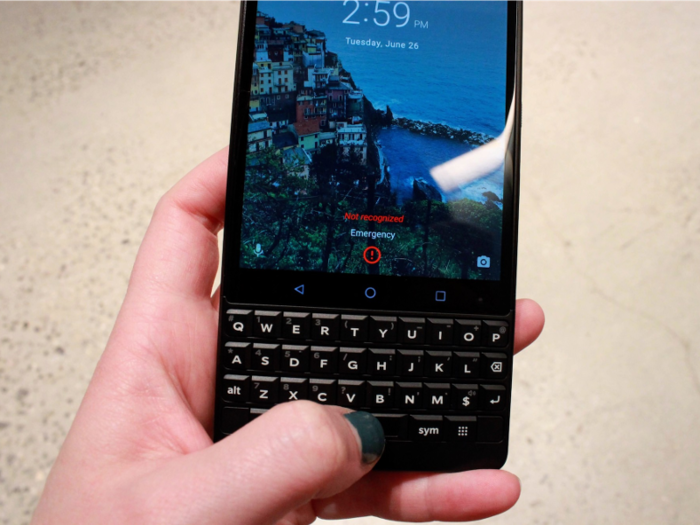
I was excited to try the fingerprint scanner on the BlackBerry Key2, because I loved how subtly it was built into the phone's design. The scanner lives inside the space bar, which means you should just be able to press it lightly to unlock your phone each time.
It's a great idea in theory, but it isn't very practical in real life.
The space bar is a long, narrow rectangle, and it's not ideal for capturing fingerprints. About 80% of the time, it took me several tries to get my phone unlocked using the scanner. If you didn't place your finger just right on the space bar, it refused to open your phone. This grew tiresome after a while, and I eventually just resorted to using my passcode each time.
The BlackBerry Key2 has a solid rear camera, but it's nothing fancy.
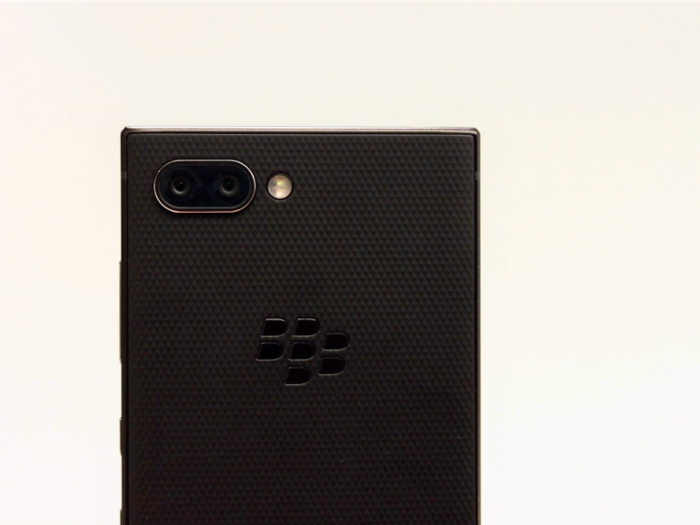
I certainly wasn't wowed by the rear camera on the BlackBerry Key2, but I was pleasantly surprised by the images it captured.
TCL added a dual 12-megapixel rear camera this year — the BlackBerry KeyOne relied on a single lens. In general, I found the photos to be quite sharp, and was continually impressed by how the camera handled close-up shots. Again, the rear camera wasn't phenomenal, but to be perfectly honest, it was better than I expected from a BlackBerry.
The selfie camera, on the other hand, was one of the worst I've used on a smartphone in the last year. The camera has a fixed focus, and most of the time my selfies came out blurry. Even when the camera seemed to focus on my face, the images were rarely as sharp as one would find on an iPhone, Google Pixel, or Samsung Galaxy phone.
That being said, I doubt the target audience for the BlackBerry Key2 consists of a lot of avid selfie-takers, so it likely won't be an issue for most people.
One surprising thing about the entire camera system is that it's unlike any other Android camera I've used lately. Most Android phones pack their cameras full of so many camera features, you feel like you have a DSLR in the palm of your hand.
But the BlackBerry Key2 doesn't have any of that — only a few filters, no advanced camera adjustments, and none of the weird face-smoothing features I've found on phones like the Samsung Galaxy S9. It's the simplest smartphone camera I've used in years, which was actually rather refreshing, since I rarely end up using those anyway.
Here's a photo I shot using the BlackBerry Key2. It's nice and sharp, and the colors are beautiful, but it did struggle a bit in bright sunlight — some of the leaves in the back are blown out.
 did struggle a bit in bright sunlight — some of the leaves in the back are blown out.' layout='fill' objectFit='cover' loading='lazy' width="700" height="400"/>
did struggle a bit in bright sunlight — some of the leaves in the back are blown out.' layout='fill' objectFit='cover' loading='lazy' width="700" height="400"/>
The selfie camera consistently produced shots that looked like this: out of focus, bland, and unable to properly handle mixed lighting.

Which brings us to the keyboard.
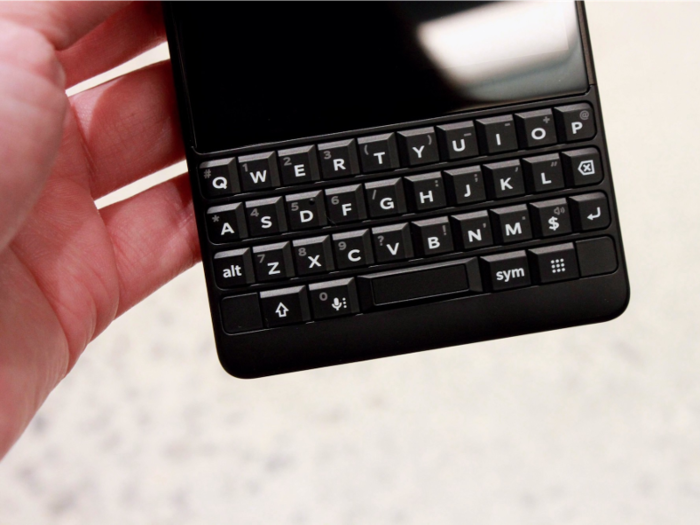
Back in the mid-to-late aughts, I owned a BlackBerry Pearl and thought it was the best phone ever made. I was adored the trackball, loved BBM-ing with my friends, and thought getting rid of a physical keyboard would be the single dumbest move a smartphone company could make.
Oh, how times have changed.
My biggest takeaway after using the BlackBerry Key2 after about 10 days is that the physical keyboard is obsolete. My teenage self would be shocked to hear me say this, but an on-screen digital keyboard is simply a better invention. It's significantly faster and more agile — not to mention the fact that a digital keyboard frees up about two inches on the front of the phone.
The physical keyboard isn't totally stuck in the past. TCL built in the aforementioned fingerprint scanner on the space bar, and the entire keyboard is touch-sensitive — when you swipe your finger over the keys to the left or right, it will work just like a touch screen.
My biggest frustrations with the keyboard were the slowness and the lack of flexibility.
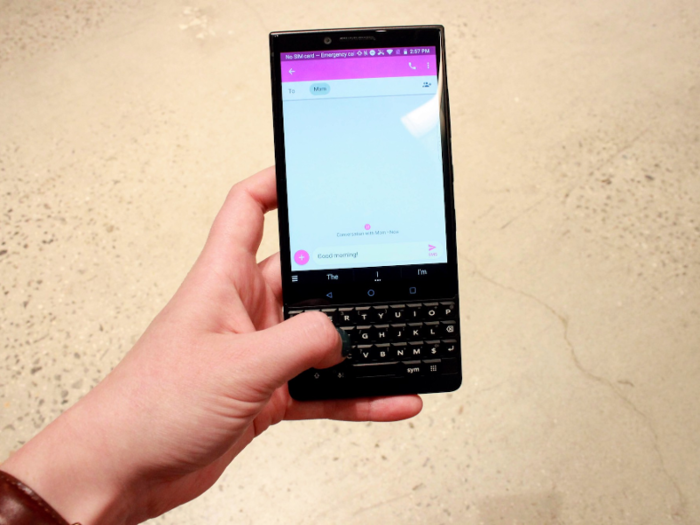
I admit that it's been about nine years since I used a BlackBerry, so I expected to be rusty when I tried typing on a real keyboard again. But even after about 10 days of using the phone, things haven't improved.
Typing on real keys took me about twice the amount of time it would take typing on digital keys. A one-paragraph email took me a little over five minutes to type out on the BlackBerry Key2, something that would have taken less than a minute on a digital keyboard. Plus, the keys are tiny, and even though I have relatively small fingers, I was constantly hitting the wrong button.
The other issue with a physical keyboard is that it's fixed. These days, it's easy to switch back and forth between letters, numbers, and symbols, or to swap between multiple keyboards on your phone. That's not possible with real keys, so BlackBerry's solution was to bring up an on-screen keyboard to help with symbols. This just created confusion, since it was hard to prioritize your physical keyboard when there's a perfectly good digital keyboard right there on the screen.
So while the physical keyboard is nice to have, I'm not sure if I would end up using it the majority of the time. By the end of my time with the BlackBerry Key2, it started to feel more like a novelty item than a helpful feature.
Physical keyboard aside, the BlackBerry Key2 is made for speed and efficiency.
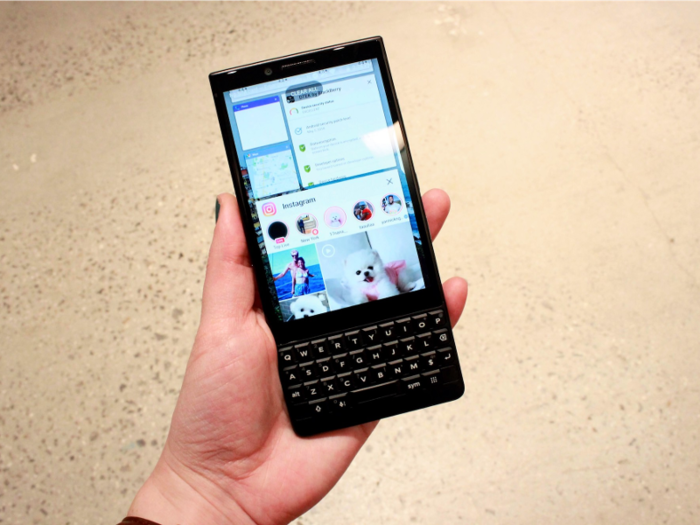
The BlackBerry Key2 seems aimed at the crowd who doesn't crave a lot of bells and whistles on their smartphone. It's efficient, easy to use, and comes with a version of Android 8.1 Oreo that, while not stock, was on the simpler side and easy to adjust to as an iPhone user.
The device has multiple shortcut keys, which are intended to help you get to your most-used apps and services without spending a ton of time hunting through your app drawer. A new shortcut key on the keyboard can be programmed to open any app (along with the press of a corresponding letter on the keyboard) and I found myself using it more than I expected. There's also a second shortcut key on the side of the device.
And since it's a BlackBerry phones, there's a lot of emphasis on privacy and security.
The Key2 comes with a few different ways to protect your device, like the DTEK app, which constantly monitors your phone's security. There's also a redactor app for hiding key words or phrases in a document or email, an app that blacks out your entire screen except for the portion you're viewing, a built-in password keeper, and the Locker app, which lets you hide away sensitive photos or open an incognito browser.
So, should you buy it?
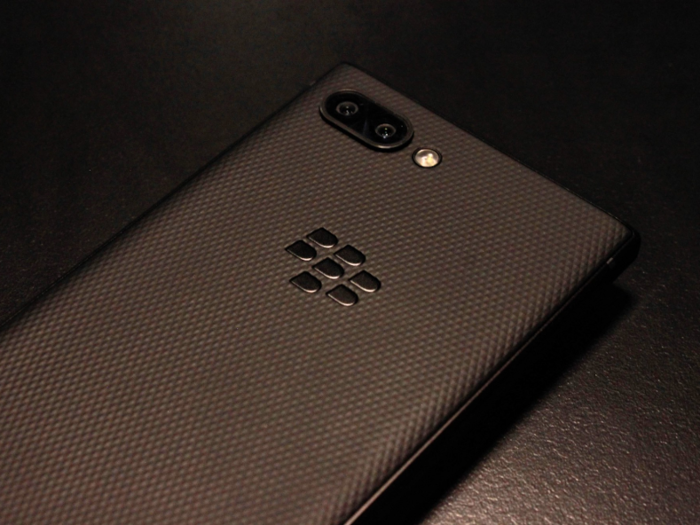
Yes, and no.
Yes, you should buy the BlackBerry Key2 if you're someone who craves speed and efficiency, and who doesn't spend a lot of time on their phone scrolling through social media or watching Netflix. If you're someone who's all business, and who cares about security and privacy, it's the perfect phone for you. Plus, at $650, it's a relative bargain.
But the BlackBerry Key2 doesn't really feel like a mass-market device. It's not a great phone for watching videos thanks to the smaller screen, it's hard to text on, and the camera isn't exactly top-of-the-line.
Still, I think there's a niche out there of people who would fall in love with the BlackBerry Key2. My barometer for the device was my dad, a longtime BlackBerry fan who reluctantly switched to iPhone a few years back. When I showed him the Key2, he said: "I'd switch from my iPhone right now."
Case closed.
Popular Right Now
Advertisement